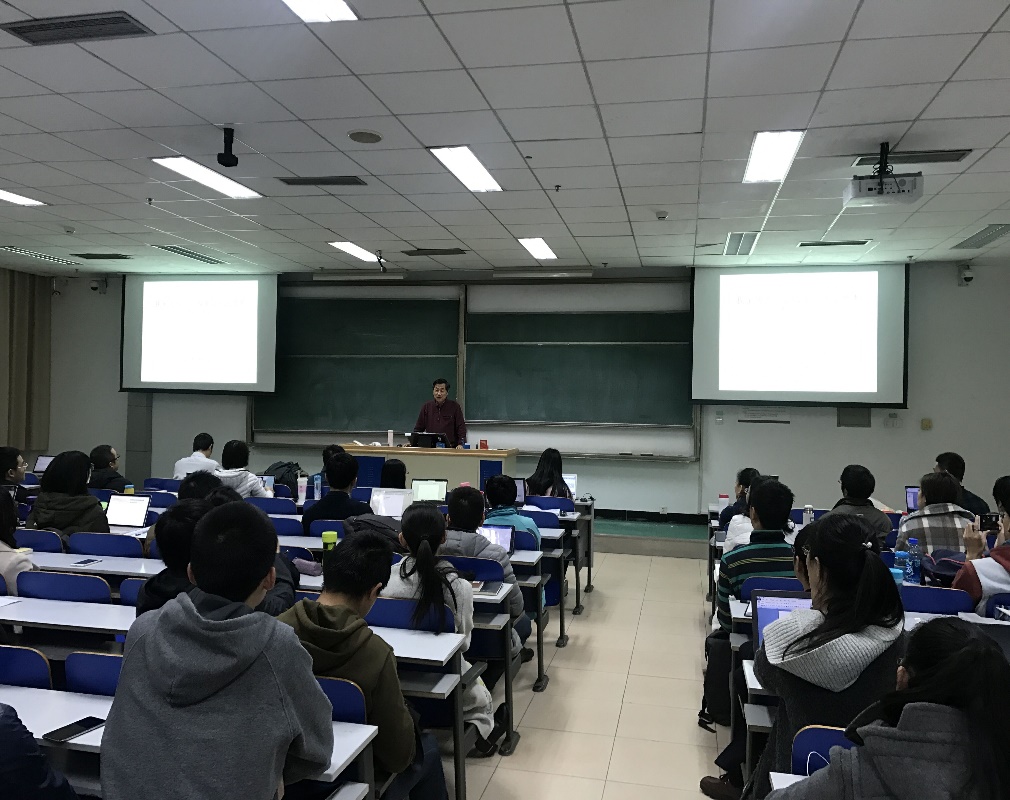 Research Update
Research Update
22
NovemberOn Nov. 22nd, 2018, the 4th lecture of “To Face the Real World” series hosted by National Academy of Development and Strategy (NADS) was held in Room 1406, No.1 Public Teaching Building, Renmin University of China (RUC). Mr. Zhou Fangsheng, Deputy Chairman of China Enterprises Reform and Development Society, was invited to give a lecture titled “My Experience in SOE Reforms and the Theoretic Findings”.

Based on his personal experience, Mr. Zhou summarized the history of China SOE reforms in the past 40 years, evaluated the lessons learned from rounds of reforms, and proposed his new idea for the next step of SOE reforms. Prof. Liu Ruiming of NADS joined as a guest in discussion. The lecture was presided by Prof. Nie Huihua, Deputy Dean of NADS. Teachers and students from different departments of RUC listened to the lecture.
Based on his 40-year experience and findings, Mr. Zhou concluded that the most important lesson drawn from China reform and opening up was to delegate the authority and to streamline the administrative system. He took examples of the farmers, enterprises and families to illustrate that the key of reform is delegation. He pointed out that the essential dynamic of the 40-year reform is “sunlight, room and freedom”. But there existed controversies on whether to give “sunlight” or not and how much “sunlight” they should be given. In his opinion, delegation of the authority and streamlining of the administrative system were of most importance. The government should continue to return the power and interests to common people, and motivate them to create and possess fortune on their own. Then he elaborated on the transformation of the planned economy based on his own experience. He also introduced the restructuring and reposition of redundant personnel in the three-year-off-the-hook plan, and the SOEs’ mixed ownership reform, taking Lin Zuoming from Shenyang Liming and Hu Zijing from Changsha Friendship & Apollo for instance.
Mr. Zhou pointed out that the objective of enterprises reforms is to construct a community of shared destiny, and presented a distinguished idea of “benefit sharing”. He thought that among the interests of shareholders, enterprises, employees, clients, bondholders, suppliers and communities, the critical ones were the interests of employees. The enthusiasm of employees could not be brought up from supervision, but motivation. Benefit sharing could solve the principal-agent problem. In this case, the internal agent changed from a benefit taker to a benefit producer.
Prof. Liu Ruiming confirmed the new idea of reform proposed by Mr. Zhou. He summarized that Mr. Zhou started his speech at the ineffectiveness of traditional economy, and then used a simple story about toilet repairing to introduce the importance of reform in delegating authority and streamlining administration. After that, Mr. Zhou introduced the remarkable idea about benefit sharing, which focused more on motivation and less on supervision. Mr. Zhou also made a clear explanation about the loss of state-owned capital. After the summarization, Prof. Liu made his own comments based on personal experience. He indicated that we often failed to figure out what SOEs should do under the “New Normal”. SOEs should undertake multiple levels of responsibilities. On one hand they should reach the profit targets. On the other hand they should also play the political roles and undertake their social responsibilities, such as solving employment problems.

In the final Q&A session, many students raised up questions about the incremental reform and the loss of state-owned capital. Mr. Zhou answered the questions in detail. All students benefited a lot from the lecture.